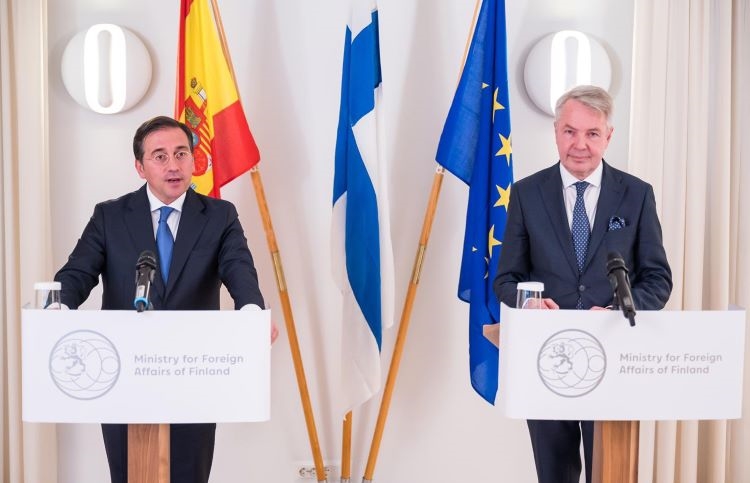Eduardo González
Foreign Minister José Manuel Albares yesterday in Helsinki expressed Spain’s support for Finland’s membership in NATO because “it is a consolidated democracy and NATO is an alliance of democracies.”
“Of course, it is a sovereign decision of Finland and it is not up to me to decide, but I have listened very carefully to Minister Haavisto and, of course, it is a decision that we will have to take together in NATO,” Albares said during the joint press conference following his meeting with Finnish Foreign Minister Pekka Haavisto.
“For Spain, Finland is a consolidated democracy and, therefore, it seems normal to me that Finland has a place in NATO, which is an alliance of democracies”, added Albares, who will visit Lithuania today to “visit the Spanish troops participating in the Alliance’s mission to protect the Baltic republics”, as he informed at the press conference.
Likewise, the minister recalled that “Finland is a member of the EU, like Spain, and is therefore covered by the mutual assistance clause provided for in Article 42 of the EU Lisbon Treaty”. “For that reason, it would be nothing new for Spain to have Finland in the NATO family, because we are already prepared to show the same solidarity that we have within the European family,” he assured.
For his part, Haavisto said at the same press conference that “Finland is considering the possibility of joining NATO” because “European security has changed in recent months” after the start of the Russian invasion of Ukraine and Russia “is prepared to take greater military risks in its operations” by “deploying troops and conventional, nuclear and chemical weapons.” “That worries us,” he added.
Finland’s Parliament began debating last week on the country’s possible NATO membership in response to the climate of insecurity generated by Russia’s war in Ukraine. In case of parliamentary approval, Finland could submit its membership application before the next NATO summit in Madrid at the end of June. At the moment, more than half of the Parliament has already come out in favor of membership.
The NATO accession process is much faster than that of the EU and could be completed in about four months. It requires the unanimous support of all 30 NATO members, following ratification in the parliaments of all member states. The initial support of the governments is almost taken for granted, but the parliamentary process seems to be a more complicated hurdle. Pending what might happen, the Kremlin’s Russian Foreign Ministry spokeswoman, Maria Zakharova, has warned that Finland’s entry into NATO would have consequences and former Russian President Dmitry Medvedev recently stated that, if it were to join, “Russia would have to strengthen its defenses in the Baltic Sea region, including through the deployment of nuclear weapons”.
Finland, which shares a 1,300-kilometer border with Russia (and has a large Russian-speaking community), has historically been characterized by a strict neutrality that has helped it avoid problems with its powerful neighbor and play a prominent role as a mediating country in conflicts. However, although Finland is not a member of NATO, it has been part of the Alliance’s group of partners since 2014. Russia’s aggressive policy has substantially changed the rules of the game, to the point that 65% of Finns are in favor of NATO membership, something absolutely unthinkable until not so long ago.






